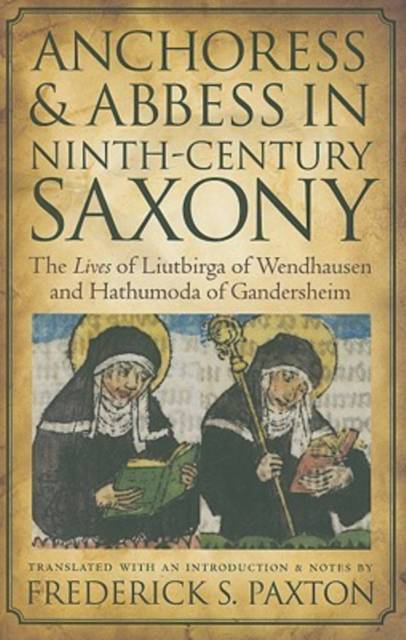
- Afhalen na 1 uur in een winkel met voorraad
- Gratis thuislevering in België vanaf € 30
- Ruim aanbod met 7 miljoen producten
- Afhalen na 1 uur in een winkel met voorraad
- Gratis thuislevering in België vanaf € 30
- Ruim aanbod met 7 miljoen producten
Anchoress and Abbess in Ninth-Century Saxony
The Lives of Liutbirga of Wendhausen and Hathumoda of Gandersheim
Frederick S PaxtonOmschrijving
Around the year 840, Liutbirga, the adopted daughter of a noble Saxon widow, asked to be walled into a cell in a church at one of the family's cloisters for religious women. She spent the last thirty years of her life in her cell, doing penance for her sins, fending off attacks by the devil, and instructing women in religion and handiwork through its one small window. Hathumoda, the daughter of a noble Saxon couple whose progeny would establish the first German empire, became abbess of a similar community of women when she was twelve years old. She too spent the rest of her life there, dying at the age of thirty-four in the course of an epidemic that swept across northwestern Europe. In spite of their confinement, both women made so great an impression on those who knew them that substantial biographies appeared within a few years of their deaths.
In the growing field of early medieval texts in translation, this book presents the first full English translations of the Lives of Liutbirga of Wendhausen, the first anchoress in Saxony, and Hathumoda, the first abbess of Gandersheim. The introduction and notes tell the story of the remarkable survival and transmission of the Lives and describe the ninth-century Saxon world that produced them and their authors.
Although praised by their biographers for their holiness, Liutbirga and Hathumoda are not presented primarily as wonder-working saints, but as real flesh-and-blood women, pursuing sanctity in a world driven by family and ecclesiastical politics as much as spirituality. Histories of the women's families as well as memorials to their heroines, the Lives of Liutbirga and Hathumoda shed new light on a vibrant corner of Christian Europe in the century after Charlemagne.
ABOUT THE TRANSLATOR:
Frederick S. Paxton is Brigida Pacchiani Ardenghi Professor of History at Connecticut College. He is the author of several works including The Cluniac Death Ritual in the Central Middle Ages (forthcoming) and Christianizing Death: The Creation of a Ritual Process in Early Medieval Europe.
PRAISE FOR THE BOOK:
"This volume presents the stories of two very interesting Saxon figures. . . . The translator has presented the texts in a comfortably readable English. . . . These well-translated texts, not to mention the lengthy introduction, extensive bibliography, and other helpful materials, should be of value for anyone studying female saints' lives and for exploring the world of Saxon Christianity." -- J.S., Magistra
"The two historical works are important for the study of women's spirituality in the Middle Ages. They are important for the life of canonesses and medieval family monasticism. These two works are important because of the transition of Saxon culture to Frankish culture and life. Finally, the two Lives move us from religious life to social transformation."--Cyprian Davis, American Benedictine Review
"Frederick S. Paxton is to be thanked for making these two difficult texts . . . accessible to a wider readership in plain and readable English. . . . [T]he book's 79-page introduction does an excellent job of introducing and contextualizing the texts, and points the reader in the direction of related work. . . . By providing an expert and thoroughly contextualized entrée into a world often shrouded in the arcane of Germanophone historiography, Paxton extends our understanding of Carolingian Saxony even as he introduces it."--Simon MacLean, English Historical Review
"In making [these books] available in such a scholarly translation he has performed a great service for both students and their teachers."--Sarah Hamilton, Journal of Ecclesiastical History
"The two English translations of the Lives of Liutbirga and Hathumoda are excellent and pleasant to read."--Sibylle Jefferis, Journal of English and Germanic Philology
Specificaties
Betrokkenen
- Auteur(s):
- Uitgeverij:
Inhoud
- Aantal bladzijden:
- 204
- Taal:
- Engels
- Reeks:
Eigenschappen
- Productcode (EAN):
- 9780813215693
- Verschijningsdatum:
- 18/02/2009
- Uitvoering:
- Paperback
- Formaat:
- Trade paperback (VS)
- Afmetingen:
- 140 mm x 216 mm
- Gewicht:
- 317 g

Alleen bij Standaard Boekhandel
Beoordelingen
We publiceren alleen reviews die voldoen aan de voorwaarden voor reviews. Bekijk onze voorwaarden voor reviews.











